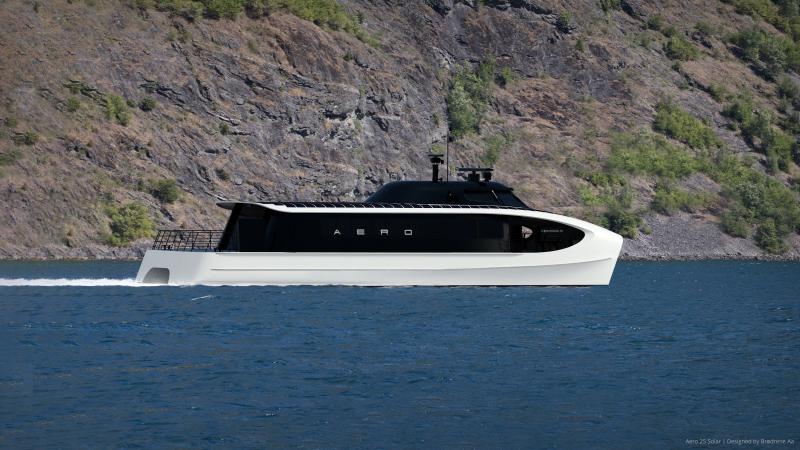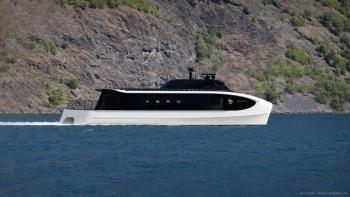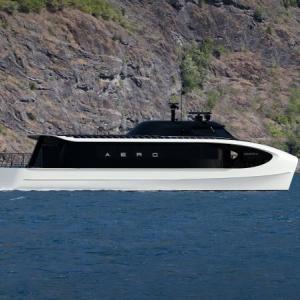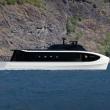UPDATED WITH DOT COMMENT: Island citizens, businesses propose cutting edge passenger ferry service for Penobscot Bay
PENOBSCOT BAY — The idea remains conceptual, people behind it emphasize, but they are looking longterm, past a global pandemic, past budgetary constraints, past the current economic contraction. Their goal is for Penobscot Bay islands to be serviced by energy-efficient, environmentally-sound passenger ferries that would run between Islesboro and Belfast, and perhaps North Haven and Vinalhaven and Rockland.
While in the introductory phase, support has nonetheless already been secured from Belfast City Council, as well as the Islesboro Select Board, the Town of Vinalhaven, its emergency services, as well as numerous Maine entities.
Likewise, letters of support from the University of Maine, the Maine Marine Trades Association, Maine Technology Institute, Maine Composites Alliance, and more, have been sent to the Maine Dept. of Transportation, which owns and operates the Maine State Ferry Service.
“In the longterm, we are looking at maintaining the sustainability of the islands,” said Islesboro resident Earl MacKenzie, who is one of a consortium of people and businesses interested in moving a new passenger ferry model forward. “It would have an enormous impact on the well-being of the Midcoast.”
Add even more routes, such as Belfast to Castine, and opportunities for connecting Maine harbors with a ferries would be something not seen since the days when steamboats the plied the coast, carrying people from harbor to harbor, and Maine to Boston.
The proposal (See attached PDF) was presented to the Islesboro Select Board April 29 and the Belfast Council, earlier in April. Both boards endorsed the idea, with Islesboro voting April 29 to support the ferry proposal and send a letter to the Maine DOT expressing so.
“Benefits of such a ferry would be that stores and services would be within walking distance once in Belfast, people from the mainland and the island could work full time, and if the ferry were to be electric, there would be environmental benefits,” the Islesboro Select Board April 29 minutes said. “Roger Heinen clarified that this is not a town proposal and that it would not affect taxes. Gabe Pendleton [Islesboro selectman] as well as other Select Board members are supportive of investigating alternatives to the Maine State Ferry Service as they are all in agreement that ferry ticket prices will continue to rise.”
It is an idea built on an already working relationship between Front Street Shipyard, in Belfast, and the Norwegian boatbuilding company, Brødrene Aa, on the west coast of Norway. Brodrene builds carbon fiber composite fast ferries, and has teamed up with Front Street to create a new Maine-based entity, Arcadia Alliance, to construct ferries in the United States, specifically, Maine.
That venture of building new ferries for the Maine State Ferry Service could create up to 75 new jobs in Belfast at Front Street, which pleases the Belfast City Council.
“The employees required for the construction of high-speed ferries at Front Street Shipyard, development of land-based infrastructure and subcontracting opportunities for Maine’s boat building and composites industries will benefit businesses and families in our community,” wrote the city, in an April 22 letter to William Pulver, chief operating officer for the Maine DOT.
Arcadia Alliance outlines its mission as: “designing and building ferries that require less fuel, produce fewer emissions, require less maintenance and have a higher resale value than ferries built of steel or aluminum. Using carbon fiber, Arcadia Alliance produces lightweight, strong structures that experience no corrosion, leakage or condensation damage.”
There are many details to explore, including financing and operations, not to mention, DOT interest.
But, according to Erik Grimnes, who is Arcadia Alliance’s vice president for sales and marketing, there is time, and everyone recognizes the current pandemic remains paramount with state leadership.
On the other hand, what better time to begin preparing for a post-pandemic landscape, when possibly more people might be interested in settling on Penobscot Bay islands, both Grimnes and MacKenzie point out.
“This [pandemic] could mean increased interest in island living,” said MacKenzie, citing the growing number of residents on Islesboro that are working over the internet via the island’s powerful broadband system.
The idea germinated more than a year ago, as Islesboro faced a spike in ferry service ticket rates, the result of the DOT trying to balance revenue versus expenses of the ferry service.
The debate over the resultant hike in ferry ticket prices was long and belabored, as the island communities, in particular, Islesboro, reckoned with much higher commuter and travel costs for its residents, who depend on the Margaret Chase Smith ferry that runs between Grindle Point and Lincolnville Beach.
With a magnet school on Islesboro, which educates mainland students, as well as island students, plus a thriving trade servicing the summer cottages of seasonal home owners, the conversations evolved toward imagining an overhaul of the existing ferry service.
What if a high speed passenger ferry ran down the west side of Penobscot Bay, between Belfast and Islesboro? What if Maine could phase out its current ferry design, reliant on naval architecture of the 1980s? What if Maine could shift its fossil fuel dependent ferries to solar power.
“Maine is supposed to be the leader in this kind of stuff,” said MacKenzie. “We shouldn’t be looking at the same old models. We should be out in front.”
The vision
Should the state, in particular, the DOT and the Governor’s Climate Council, warm up to this idea, then Arcadia Alliance would pursue Phase I, which entails contracting with Front Street Shipyard to build a $3.8 million 75-passenger carbon fiber low-emission diesel ferry for the Belfast-Islesboro route.
Phase II would have Front Street building another ferry, this time a $4.8 million electric model, for the Islesboro route. The Phase I ferry would then be placed in service for other Penobscot Bay islands.
The ferries would be constructed of carbon fiber, which would contribute to reduced fuel and maintenance costs.
Embedded in the proposal is the allegiance to the Governor’s Climate Council Initiatives.
Those initiatives sit under the newly formed state Office of Policy Innovation and the Future, which Gov. Mills created after taking office in January 2019.
She committed to “combating climate change and encouraging clean energy policy one of her top administration priorities,” according to the office.
Gov. Mills established the Maine Climate Council and charged it “with developing a plan to meet state greenhouse gas emissions reduction targets that are now in law, including a gross 45% greenhouse gas emissions reduction below 1990 levels by 2030 and at least 80% by 2050.”
The new ferries fit right into these state goals, proponents say, and would:
Provide Maine DOT and the State Ferry Service opportunities to address Governor’s mandate to reduce regional emissions.
Help reduce carbon dioxide reduction through meaningful removal of vehicles along the coast.
Have the “strong potential to reduce underutilized vehicular ferry trips between mainland and islands.”
Use the most advanced and proven ferry technology in the world.
Reduce the need for inefficient smaller vessel trips currently needed to support island community life.
The nonprofit Maine Technology Institute, in its letter to Pulver, said the ferry opportunity, “could be a game-changer as Maine would be a national leader as the first U.S. manufacturer of the carbon fiber ferries and would derive meaningful economic benefits from it.”
Likewise, Arcadia-Alliance is banking on the rapid ferry model to help ease the strain on the state’s existing ferry service, and enhance public safety with the inclusion of an emergency medicine space aboard the ferries to transport patients to and from the mainland.
Pitching the State of Maine
In an April 24 email to the DOT’s Pulver, Arcadia-Alliance President Martin Grimnes said the implementation of a “transformative passenger-only ferry service” would allow greater flexibility with personnel and vessels, and improve, “the safety to island communities with significantly improved ambulance service, and given today’s COVD-19 situation, it will allow MSFS to help bring the economy back through job creation.”
He said that the time is ideal for innovative change and for considering a new approach to the existing ferry system.
“The addition of a commuter-only service will make the [ferry service] a part of the solution in a post-COVID-19 Maine.”
Grimnes cited the conversations that grew out of a working group representing Islesboro and Vinalhaven, “both having a keen interest in commuter and medical transportation to and from the mainland, and what it means for their respective communities.”
In order to present a “shovel-ready” proposal to the state, the group also enlisted U.S. Bancorp to outline a financing proposal for a possible agreement between the privately-owned Arcadia-Alliance and the State of Maine.
According to the May 7, 2020 minutes of the Maine State Ferry Advisory Board reflected a dramatic decline in overall ferry use, due to the pandemic. That system includes not just the ferry Margaret Chase Smith, which transports the public to and from Islesboro, but other ferries running to Frenchboro, Matinicus, Vinalhaven, North Haven and Swans Island.
“In April 2020 we will see the [ridership] decline due to COVID19,” the minutes said. “2020 is 3.5 times the decrease from 2018 [when ticket prices first increased]. Vehicle ridership is down over 50%. Passenger ridership is down over 60%.”
Ticket revenue generated from the ferries was down $72,000, while parking revenue was up $25,000. Additionally, the ferry service was anticipating relief funds with $2 million from the Federal Transit Assistance CARES Act (Coronavirus Aid, Relief and Economic Security Act).
“This is a federal credit due to a stimulus payment,” minutes said. “It is a grant that does not need to be repaid.”
With proposal comes a broader economic appeal for the state, including more ,activity in Belfast and Castine, improved tourism opportunities, strengthens the state’s supply chain infrastructure, and, “establishes Maine as the national leader in construction of composite ferries.”
And that, the consortium agrees, “allows Maine to continue a 400-year old national leadership in shipbuilding.”
Reach Editorial Director Lynda Clancy at lyndaclancy@penbaypilot.com; 207-706-6657
Event Date
Address
United States





























